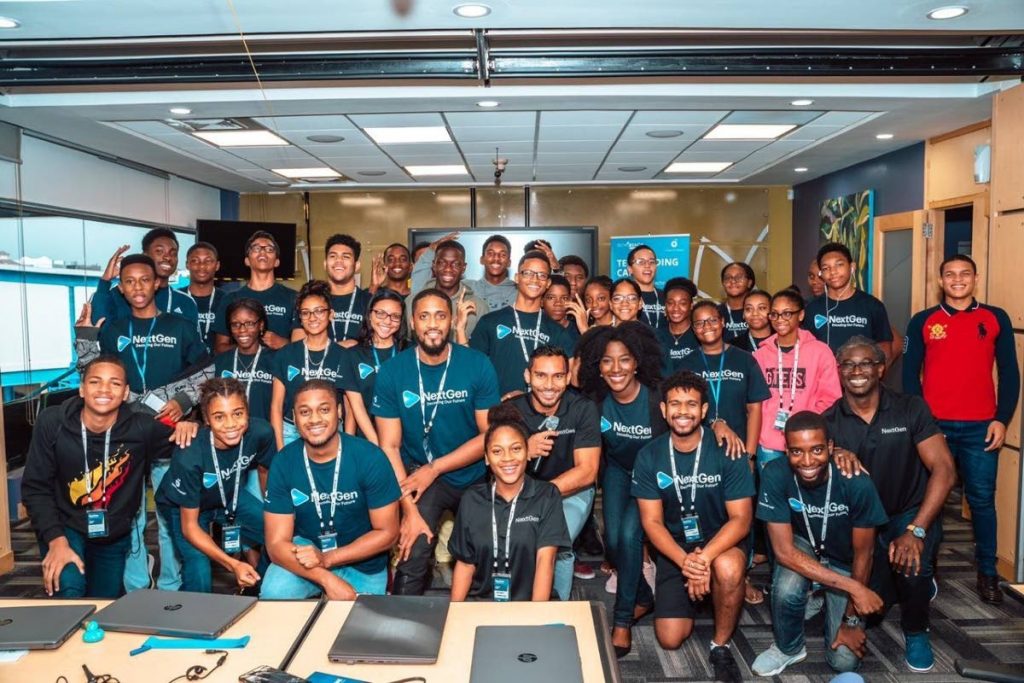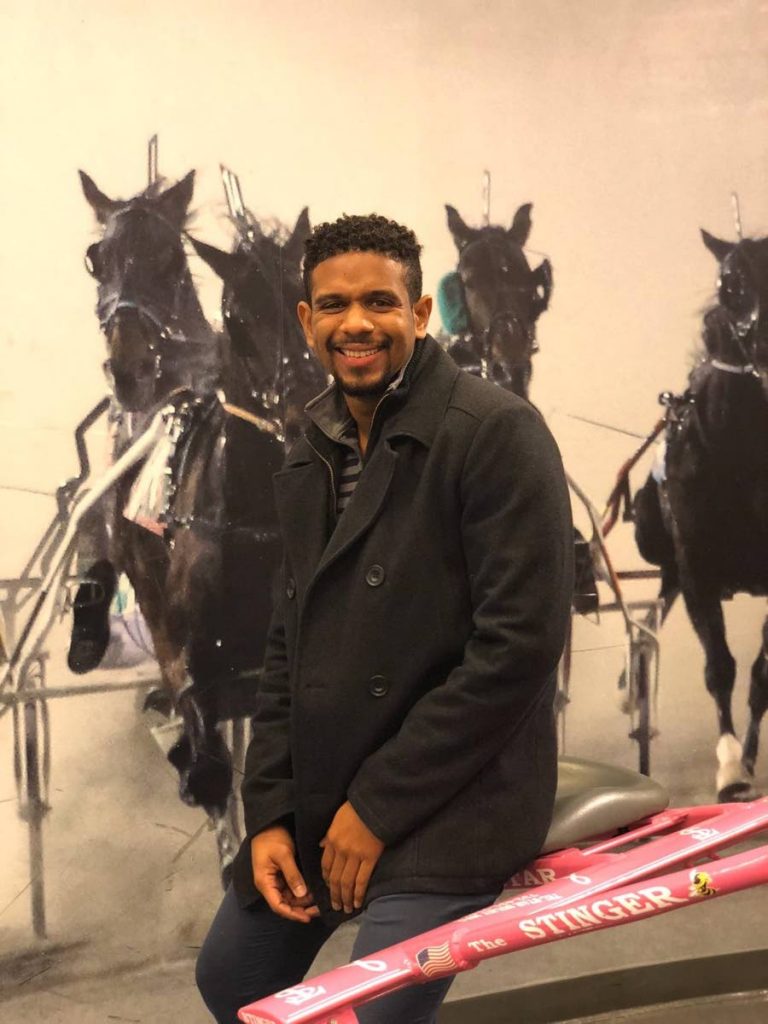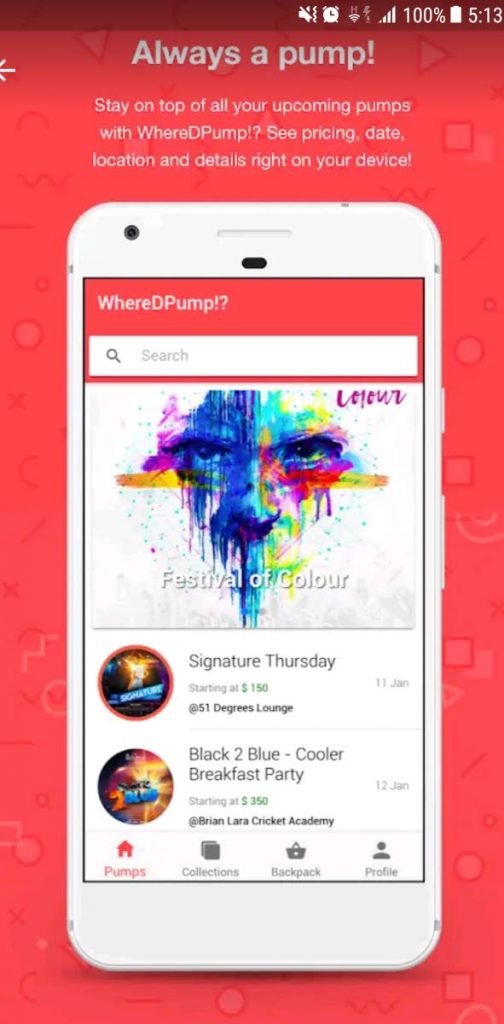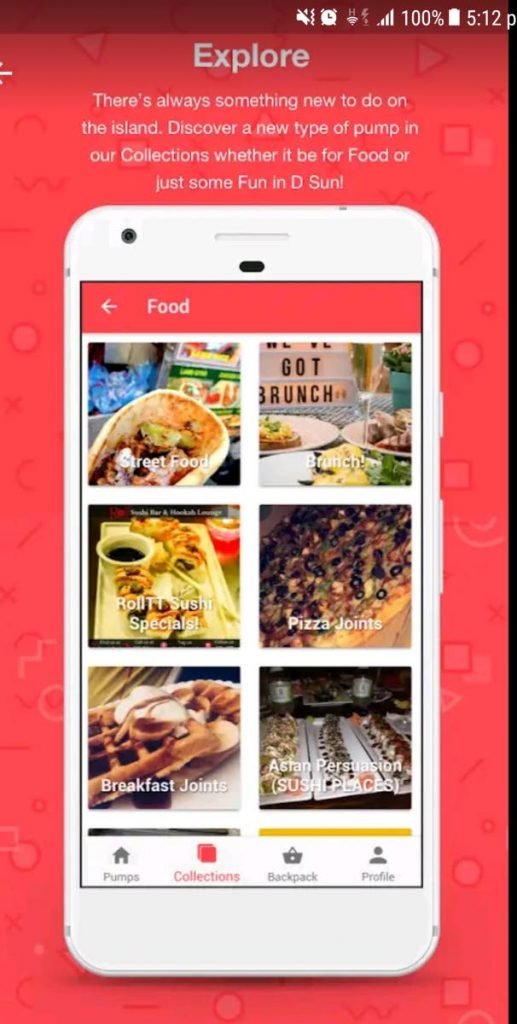Trini app developer finds success in New York

There was no plan B. Jonathan Agarrat knew that as he walked through the departure gates at Piarco International Airport to get on his flight to New York, there was no turning back. He was set to attend the New York Institute of Technology to study computer science and as he said his goodbyes to his family, his grandfather, who had pooled all his resources to help his grandson make at least his first year’s tuition fees, pulled him aside and gave him some advice.
“He said to me, ‘You’re going to a place where there are infinite opportunities. But there are just as many distractions.’
"That was it. But I knew what he meant and I knew what I had to do,” Agarrat recalled during a recent interview with Business Day in New York.
He also knew his worth. His grandfather was willing to put up the first year’s tuition, but made it clear that the second year might not’t be that easy, so he would have to figure out something soon. He realised pretty early on that university wasn’t for him, but he stuck with it, eventually graduating a year early and even getting placed on a fast-track to complete his master’s degree.
It’s not that he didn’t like learning. In his spare time, he would find a way to attend hackathons – competitions in which groups have to work together to solve problems using technology – even if they weren’t at his university, and whenever he could, he would take online courses to improve his understanding of coding and computer programmes and techniques.
He won a hackathon that happened to be sponsored by a top New York-based investment bank, which was sufficiently impressed with his skills to offer him a very lucrative internship, and eventually a position on their IT team, where he still works today.

With this job, he was able to pay for his degree. The company even paid for his first trip back home since leaving for school.
“When my grandfather saw me he was like, 'What are you doing here? Who is paying for this ticket?' I told him.”
Agarrat had figured it out.
'Hacking' it out at school
Agarrat, 24, wasn’t always a techie. At school, he always had an aptitude for science and had planned to follow in his grandfather’s footsteps and study biomedical engineering. In Form Six at Fatima College, he had a teacher, Arthur Thompson, who was also an app designer and willing to answer questions from a curious, precocious 17-year-old. When Agarrat was halfway through Form Six, Thompson got offered a job at Google.
“That was inspirational that hey, we could do this too.”
Still caught up in the idea that he needed to prepare for a “real job,” Agarrat changed his mind and switched to computer science when a college recruiter suggested it would be a more versatile foundation, especially if he was interested in tech.
“I don’t think school is for everyone and I didn’t think it was for me. But my time at school, I would spend it going to hackathons. I would go to different universities and work at their hackathons. That’s how I learned, from those groups.

"I took a lot of online courses. I learnt to develop apps from online course. I started getting more and more into tech and realising how much I could do and how easy it was to have access to it. All I needed was an internet connection and computer.”
He took a tech entrepreneurship boot camp in London and learnt the basics of how to run a business, including product management, design, research and how to analyse feedback.
He was starting to feel ready to start his own thing.
It's more than the business
Being an entrepreneur is hard work. Agarrat acknowledges that clearly.
“Entrepreneurship is glorified. It’s cool to be an entrepreneur. It’s rewarding, yes, and fun at times but it is hard. If I could not do it, that would be great,” he says.
It’s certainly not laziness. Agarrat has the energy synonymous with youth. He is passionate and charismatic and his fervour and joy are inspiring. He can make a Luddite enthusiastic about learning how to code.
His most endearing feature, though, is how much he just wants to get things done.
“I more care about things getting done. If I’m building a company and someone else starts building the same kind and they’re doing it right, I’ll stop because running a business is hard.”
Unlike most people who feel pressured to be first and protectionist about ideas, Agarrat instead is more than willing to share his and feels glad when other people take them and build on them.
“People believe that if you tell somebody an idea, they will steal it. The reality is, that doesn’t happen all that often, and if they do, the chances of them being successful is even more rare, because it takes grit, grind and passion to build that business.”

In 2017, he put five ideas online with visuals and even a business plan, but two years later, nobody was willing to take it up and get it done, even though they were well received and there was definite curiosity.
“It was well received. People liked it, retweeted, thought it was actual businesses and wanted to know what the actual link to them was, but it wasn’t real. I put it out there for someone to make it real.”
This year, he’s decided he’ll just build them all and put them online and whoever wants to be part of the team can message him about it.
“I have (so) many things happening that I can’t do it all on my own. People will be like, 'You’ll lose out, people will steal your ideas.' No, they won’t, I won’t because I have lots of ideas. I more care about it getting done than if I do it.”
Getting pumped up
The first app Agarrat developed – still in operation today – is WhereDPump. It’s a party app (because like every good Trini he likes to party) and was created in conjunction with his childhood friend Andel Husbands.
“He’s really good with design and user interface and I was really good with coding. I was also working on something called Out on the Avenue when he told me about it.
"So he had a product that looked really good and I had one that worked really well. So we came together. And WhereDPump sounds better anyway,” he said.
The product, which helps users find the details on the best parties in TT, launched in December 2014 via Agarrat’s website and then officially as an app in June 2016 and has about 14,000 users. During the peak season they can have 1,000 active users a day and for Carnival itself, up to 7,000 active users.
“When we built it a lot of people said they had the same idea and I was like, 'Well, why don’t you build it?' I built this because it didn’t exist and basically it came down to one, how much people didn’t want to take on entrepreneurship and two, how much they had access to the opportunities I had to learn.”
So, he realised another business opportunity.
“If you have an idea and a budget and I have the talent, then we can work something out. So, I started IslandHackers.com next, which was essentially: tell me your idea, and I’ll build what you want, and you pay for it.”
Operating strictly by word of mouth, because he didn’t really want to take on too much work at a time, Agarrat says IslandHackers.com did really well, and so far, has been profitable, with enough clients and recurring clients.
Youth isn’t always inexperience
Agarrat is selective about who he takes on as clients. He has little patience for the Trinidad way of doing business, which often comes down to who you know, as well as people who might not’t take him seriously because of his age. He and Husbands started Where the Pump when they were about 17 and turned it into an app when they were 19.
“(In Trinidad) people assume that age equates intelligence. So, these two young boys trying to tell me they could build a website and asking for all this money, they want no part of that. But in the beginning, we were offering for free. How I got around that I was being resilient, but also now, I just say no. I do not want to part of government projects, or having to deal with senior people who want to take over. Anytime there is a top-down approach, I don’t want to be part of it.”
And his exposure to American culture, notably at where he works, has emboldened him.
“My boss is different. He takes me to vendor meetings and asks my opinion and even to challenge him, even though he’s the senior person. They understand fresh eyes can see things they don’t.”
It’s very frustrating to explain to somebody who is supposed to be a leader how to take a company forward and the benefits of technology, he says.
“How are you a leader and you haven’t been keeping up with this? There are courses online where you don’t have to learn how to do stuff, just understand it. And they sit there asking these inane questions and having insane demands, only to turn around and you see somebody else get the job minus the demands they had for us, so you can see it’s more of who you know.
"Then you come to America and you’re talented, and Google wants to talk to you, or Facebook – and I’m going back home to fight up with you? Conversations where you question my intelligence or what I know because I’m only 24? I have no time for that. I real cool.”
Then there are the established entities which see them as competition and want to crush them without understanding what they do.
“They say we are taking business away from them, but all that tells us is they have no idea who their audience is, because if they did, they would know that people under 21 weren’t buying their product anyway, so their best interest would be collaboration – which is what we want.”
Understanding trends is one of the key components Agarrat believes is important to success.
“You can't expect trends from a decade ago to be relevant now.”
He points to the success of cloud-based businesses versus brick-and-mortar entities that are now struggling.
“Yes, before, it would be hard to compete, but in (2020) I don’t need to make that capital expense for a storefront. It costs $0 to register on Amazon. The most I might have to pay is to register a web domain, and that’s US$12 a year. And as a student, I can get domain names for free.
"So sure, I mightn’t be able to open 100 stores to compete, but I have built the entire thing on the internet, and my generation is accepting of that. So we don’t have all that overhead. That’s the trend, and eventually by the time (traditional business) realise that they’ll slowly be losing their numbers. It’s a whole different game.”
Agarrat is keen on tracking trends. He uses social media, specifically Twitter, as well as reports for companies like consultancy firms that publish annual industry reports.
“Companies with money do research all the time and put it out there. It’s up to you to do the reading. I subscribe for e-mail updates and all that. My favourite right now is finance, and it’s trending because everyone wants to know how to invest their money now.”
Paying it forward
The most important thing for Agarrat, though, is sharing his knowledge and helping other people discover, learn and love tech as much as he does. He started Trinidad App Brewery, which is on hiatus right now, but his aim is to create a full portal with online courses on web development where people can learn.
He also volunteers at hackathons and coding camps in TT and New York. At the regional tech conference Tech Beach, he met founder Kyle Maloney and his brother Nicholas. Their interests clicked and when the brothers mentioned their intention to start a coding camp in Trinidad, he immediately jumped at the chance to help plan the curriculum and even teach some of the modules. NextGen coding camp started this past summer and the aim is to continue during every school break – mid-year, Christmas and Easter holidays.
“Yes, I have my Trinidad App Brewery, but it’s not a competition. The goal is about moving the country forward and getting these things out. It’s not about what’s mine and what’s yours, it’s about collaboration.”
About 60 young people – ages 12 to 18– who never knew anything about programming now know how to build their own websites and are asking how to get better.
“That moment where you see that you changed somebody’s life, showed them a whole new path they weren’t exposed to – that’s what makes it worth it. Because our current education system has no sort of tech curriculum in it, but the entire world has moved over to technology, so (they) are being prepared for some future that is not going to (be obsolete).”
The younger ones come in to the camp and their looks say their parents forced them to go, he laughs, but after a day or two, suddenly they are more engaged.
“After the first class, they realise it’s not like school: you wanna talk? Talk. You wanna collaborate? Then go ahead. You wanna share your answer? Share it.
"Because (traditional education) trains students to not share. It’s a competition. When I was in school I couldn’t challenge anybody. That was disrespectful.
"We need to start reshaping our curriculum from that perspective as well, because it’s stifling innovation and growth. Kids come into camp and feel like it's school but it’s like, 'No, talk. You finished already? Help the person next to you' – and that’s a big thing. If you are finished and you see other people struggling, you help your colleagues.
"And you see them having so much fun with that. That’s how you move along. And by the second or third day it’s just a big group project where people are volunteering to help. Because peer learning is the best way of learning. Because everybody knows that half the things the teacher might say, you don’t understand until your friend shows you.
"We need to start making that environment in the classroom.”
Regardless, Agarrat sees TT as being on the verge of a tech transformation.
“It’s not gonna be overnight, but why I think it’s changing (is) because it is the natural cycle of life. (My generation) are becoming the working force. At 24, we most likely finished our first degree, are looking for a job, but over the next five to seven years, we will know how things should be and we will expect that. So we are lining that up as the workforce transitions. Because we know there’s a programme for that or an app for the other that can make life easier. And so we are going to come (expecting that) and that’s where we’ll see change.”


Comments
"Trini app developer finds success in New York"